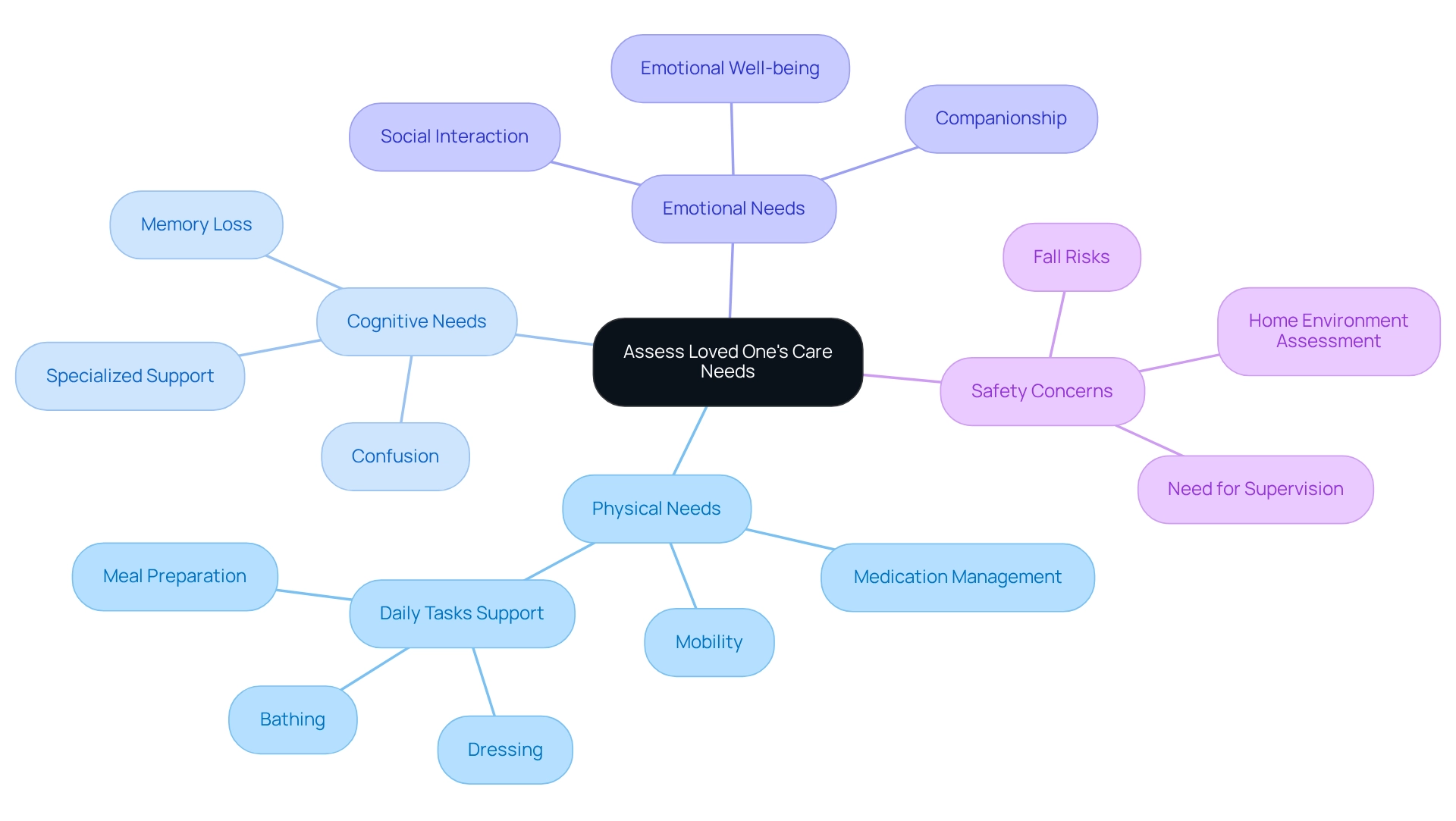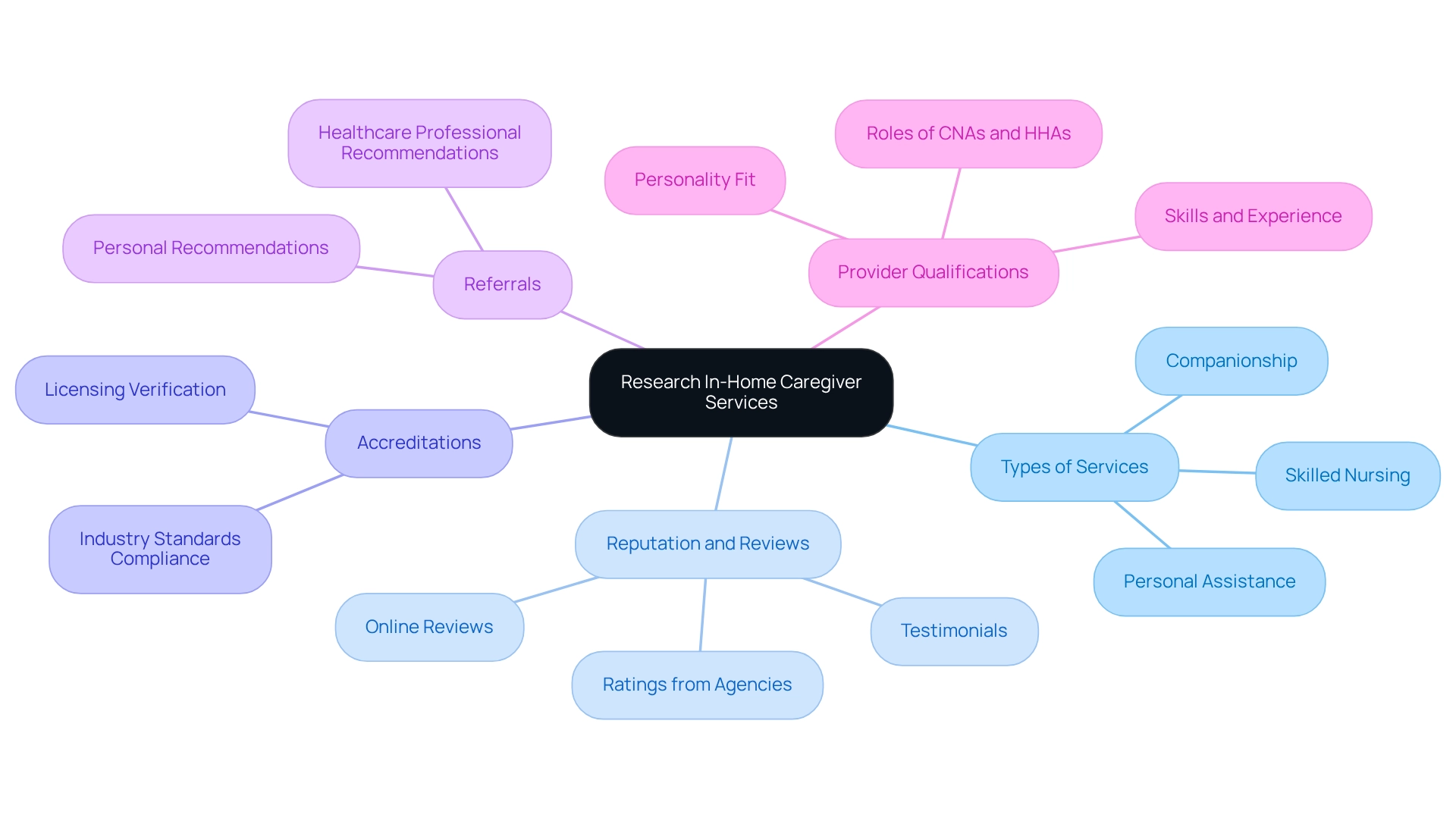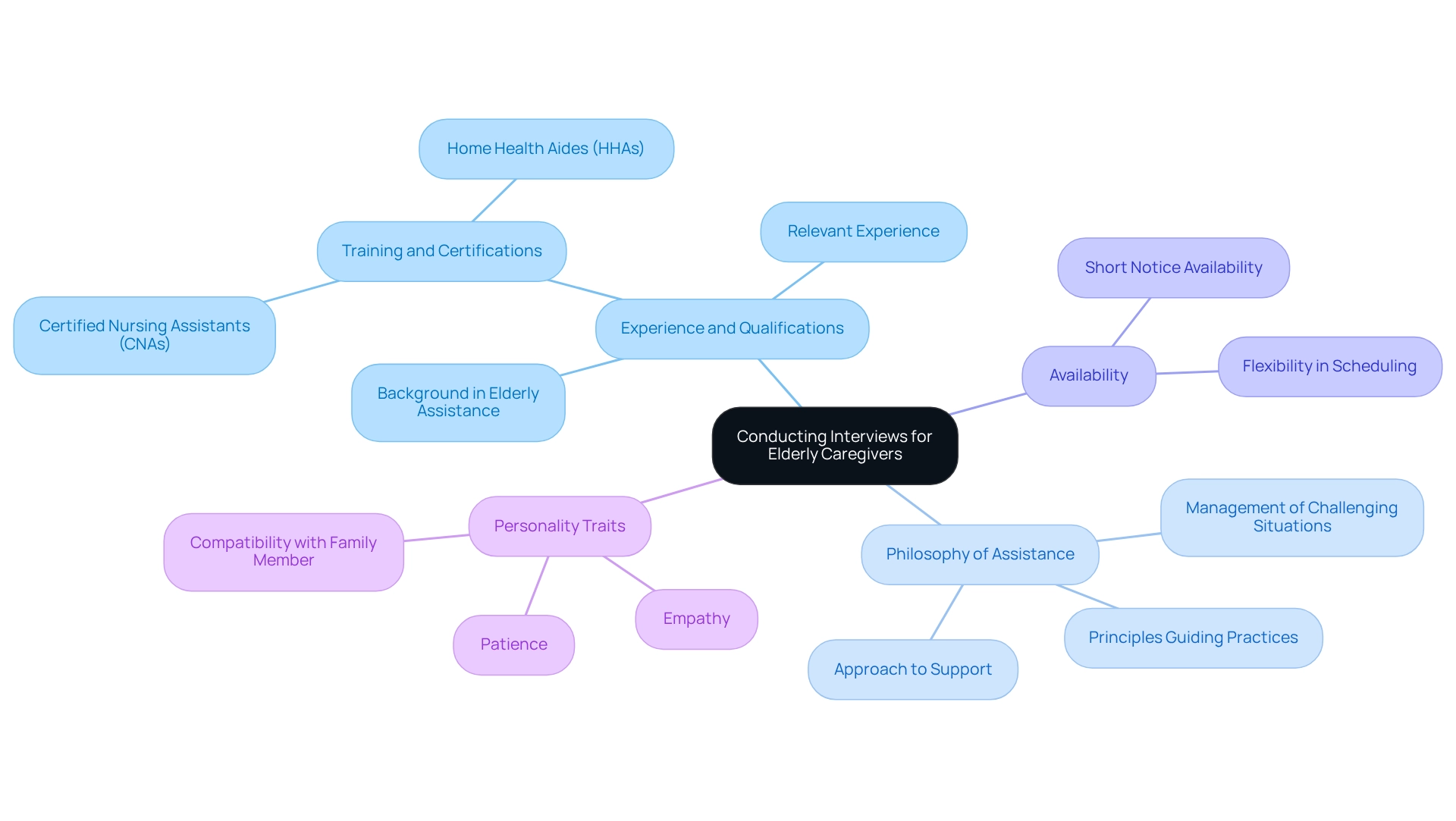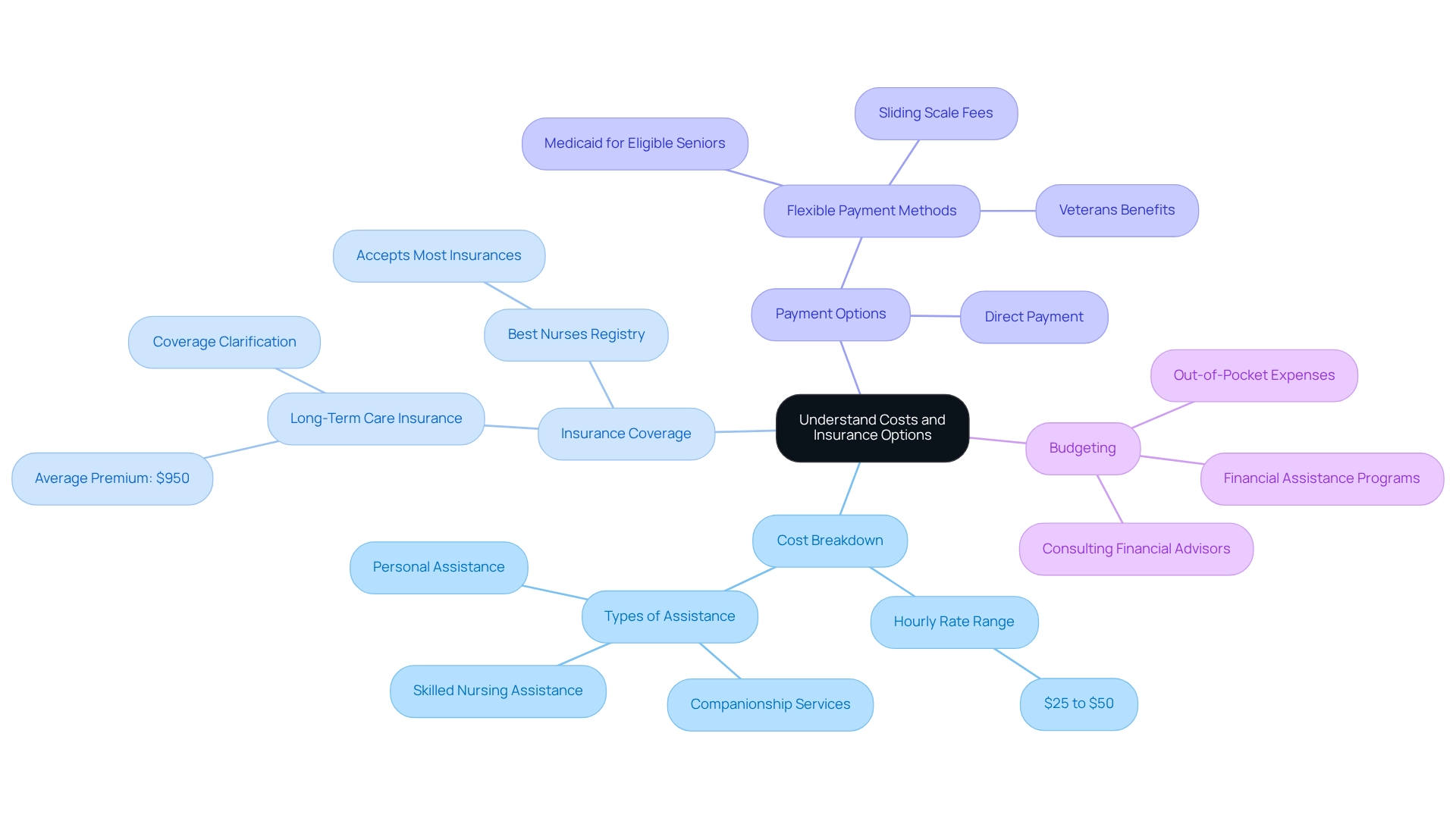Overview
Choosing the right in-home elderly caregiver is a significant decision for families, one that requires careful consideration of your loved one’s physical, cognitive, emotional, and safety needs. It’s essential to research available services and conduct interviews to ensure compatibility. Understanding the associated costs and insurance options is equally important.
We recognize that this process can be overwhelming, but a thorough evaluation of care requirements, along with a thoughtful selection of a caregiver based on their qualifications and personal fit, can lead to a positive outcome. This ensures that seniors receive the tailored support they need for a better quality of life.
Remember, your loved one’s comfort and well-being are our top priorities. We’re here for you every step of the way, providing guidance and support as you navigate this journey. Together, we can find the right caregiver who will bring compassion and care into your loved one’s life.
Introduction
Navigating the complexities of in-home care for loved ones can feel overwhelming for families. As you seek to ensure the best possible support for seniors, it’s essential to acknowledge the emotional weight of this journey. From assessing physical and emotional needs to understanding the financial implications of care services, each step requires thoughtful consideration and planning.
With the right approach, families can discover caregiver options that not only meet medical requirements but also enhance the overall quality of life for their elderly relatives. This article serves as a compassionate guide, exploring essential strategies for evaluating care needs, researching available services, conducting effective interviews, and understanding costs. Together, we can make informed decisions in the pursuit of compassionate and reliable care, ensuring that your loved ones receive the support they deserve.
Assess Your Loved One’s Care Needs
Begin by closely observing your dear one’s daily activities to identify areas where they may require assistance. Consider the following key aspects:
-
Physical Needs: Evaluate mobility, medication management, and support with daily tasks such as bathing, dressing, and meal preparation. Nearly one-third of seniors needing assistance report adverse consequences when these needs are unmet, highlighting the importance of thorough assessment. Home health services are not only more affordable and convenient but equally effective as treatment received in a hospital or nursing facility, ensuring that your family member receives the finest assistance possible.
-
Cognitive Needs: Assess any cognitive impairments that may require specialized support, including memory loss or confusion. Engaging with geriatric specialists can provide valuable insights into the specific cognitive challenges your family member may face, ensuring they receive the appropriate help.
-
Emotional Needs: Recognize the emotional support they might need, such as companionship and social interaction. Emotional well-being is crucial for seniors, significantly impacting their overall quality of life. The in-home elderly caregiver referred by Best Care Nurses Registry not only assists with daily tasks but also provides companionship, helping to alleviate feelings of loneliness and depression.
-
Safety Concerns: Identify potential safety issues within the home environment, such as fall risks or the need for supervision. Ensuring a safe living space is essential for preventing accidents and promoting independence. The adaptability of offerings provided by Best Care Nurses Registry, featuring round-the-clock assistance and no minimum hours for support, allows families to customize aid through an in-home elderly caregiver to meet their relatives’ particular needs. Recording these requirements will assist in developing a thorough profile that directs your search for an appropriate caregiver. For instance, the larger Houston region provides a variety of senior support options, demonstrating how personalized services can enhance the living experience for seniors. By clearly connecting the assessment process to these options, families can make informed choices about programs that suit their loved ones’ needs. If you are ready to explore customized support options, reach out to Best Care Nurses Registry today to ensure that your loved one receives the assistance they truly deserve.

Research Available In-Home Caregiver Services
Begin your journey toward finding in-home caregiver support by exploring local resources and agencies dedicated to assisting the elderly. It’s important to consider several key aspects that can guide you in making the best choice for your loved one.
Types of Services: Look for agencies that offer a wide range of services, including companionship, personal assistance, and skilled nursing. For instance, Best Care Nurses Registry provides patient assistance through Private Duty RNs and LPNs, ensuring that your loved one’s specific needs are met with affordable, convenient, and effective support.
Reputation and Reviews: Take the time to investigate online reviews, testimonials, and ratings from other families. Platforms like AARP and community senior centers can provide valuable insights into the quality of services offered by different agencies. A solid reputation is essential, as it often reflects the agency’s commitment to high standards of care. Best Care Nurses Registry, for example, has a long-standing history of personalized home health assistance in South Florida since 1980, demonstrating its reliability.
Accreditations: It’s crucial to confirm that the agency is licensed and accredited by relevant health authorities. This verification ensures that the agency adheres to industry standards and regulations, providing peace of mind for families.
Referrals: Seek recommendations from healthcare professionals, friends, or relatives who have firsthand experience with in-home assistance services. Personal recommendations can lead you to trustworthy agencies known for their dependability and quality service. Additionally, Best Support assists families with long-term insurance claims, helping clients maximize their benefits while receiving essential care—an important factor in your decision-making process.
Provider Qualifications: Finding providers with the right skills, experience, and personality is essential. As emphasized by Best Care, ensuring that caregivers are well-suited to meet your family member’s needs is vital for quality care. The important roles of CNAs and HHAs in assisting with daily living tasks highlight the significance of choosing qualified in-home elderly caregivers, ensuring that your loved ones receive the compassionate support they deserve.

Conduct Interviews and Assess Compatibility
When interviewing potential in-home elderly caregivers, it’s essential to prepare a targeted list of questions that will help you assess the caregiver’s suitability for your loved one. It’s understandable to feel overwhelmed by this process, but focusing on key areas can make a significant difference.
-
Experience and Qualifications: Begin by asking about their background in elderly assistance. Inquire about particular training, certifications, and any pertinent experience they possess in delivering assistance to seniors. In-home elderly caregivers who have specialized training, such as CNAs (Certified Nursing Assistants) and HHAs (Home Health Aides), are often better equipped to provide effective support, which can significantly influence your loved one’s health outcomes. Understanding their qualifications can give you confidence in their ability to manage various health-related matters, including medication administration and personal assistance tasks.
-
Philosophy of Assistance: Discuss their approach to providing support. It’s important to understand how they manage challenging situations and what principles guide their practices. This can reveal whether their philosophy aligns with your loved one’s needs and preferences. Insights from caregiving experts indicate that a caregiver’s philosophy can greatly impact the quality of support offered, especially in improving the emotional and physical well-being of seniors.
-
Availability: Confirm their availability to ensure it aligns with your family member’s schedule. Flexibility is essential, particularly if your family member requires care at specific times or on short notice. The increasing demand for an in-home elderly caregiver emphasizes the importance of finding someone who can meet your needs, ensuring that your family member receives consistent and dependable support. A caregiver’s character can significantly influence the comfort and trust level of your family member. Look for someone who demonstrates empathy and patience, as these traits are vital in caregiving. Research on caregiver compatibility highlights that a suitable personality match can lead to improved support outcomes, reducing the risk of social isolation and enhancing overall quality of life.
Consider organizing a trial period where the caregiver can engage with your family member. This allows you to observe their compatibility in real-time, ensuring that both parties feel comfortable before making a final decision. Experts suggest that trial interactions can be crucial in determining the right caregiver match, ultimately contributing to a more positive caregiving experience. By concentrating on these aspects and incorporating relevant insights, you can make a more informed decision, enhancing the quality of support your loved one receives.

Understand Costs and Insurance Options
Begin by exploring the typical expenses associated with in-home assistance in your area. These costs can vary significantly based on the services offered and the location. In South Florida, the hourly rate for in-home support generally ranges from $25 to $50, influenced by the type of assistance required. For instance, companionship support tends to be more affordable than skilled nursing assistance, which often necessitates specialized medical care.
-
Cost Breakdown: Gaining insight into the hourly rates for different types of assistance is vital. Companionship services typically fall at the lower end of the spectrum, while personal assistance and skilled nursing options command higher rates due to the expertise involved. Understanding the specific range of $25 to $50 is essential for navigating the financial landscape of in-home assistance in South Florida.
-
Insurance Coverage: It’s important to determine if your loved one has long-term care insurance or other policies that might cover in-home assistance services. Best Nurses Registry accepts most long-term health insurances directly on your behalf, which can significantly alleviate financial pressures. Many families overlook the potential benefits of these policies, so reaching out to the insurance provider to clarify coverage limits and specific requirements is advisable, as some plans may cover a substantial portion of in-home assistance costs.
-
Payment Options: Don’t hesitate to ask about payment plans or sliding scale fees available from agencies. While most home assistance providers require direct payment from families, Best Care Nurses Registry can assist in communicating with your provider to review what your policy covers. Understanding these options can help families manage the financial aspects of obtaining home assistance services. According to the case study titled “Payment Options for Home Care,” some agencies may offer flexible payment methods that can ease financial strain.
-
Budgeting: Consider creating a budget that accounts for potential out-of-pocket expenses and explore financial assistance programs available in your community. The average cost of long-term care insurance premiums is around $950, which can be a worthwhile investment for families preparing for future support needs. Additionally, think about consulting financial advisors who can provide insights on navigating insurance options for senior care. As financial experts suggest, understanding these choices is crucial for effective planning.
By following these steps, families can make informed decisions about in-home care, ensuring their loved ones receive the necessary support while managing costs effectively.

Conclusion
Navigating the journey of in-home care for loved ones can feel overwhelming, but it is a path that, with careful consideration and planning, can lead to fulfilling outcomes. By thoughtfully assessing the physical, cognitive, emotional, and safety needs of seniors, families can create a clear profile that guides their search for the right caregivers. Understanding the variety of available services and conducting thorough research empowers families to identify reputable agencies, ensuring their loved ones receive personalized and effective care.
Interviews are essential in selecting the caregiver who best fits your loved one’s needs. By asking targeted questions about experience, care philosophy, availability, and personality fit, families can gauge compatibility and build confidence in the caregiver’s ability to provide the necessary support. Additionally, trial interactions can offer invaluable insights into the caregiver’s approach and rapport with seniors, further solidifying the decision-making process.
Understanding the costs associated with in-home care and exploring insurance options is crucial for managing financial implications. By proactively researching pricing, insurance coverage, and potential payment plans, families can alleviate financial burdens while securing the vital support their loved ones need.
In conclusion, finding compassionate and reliable in-home care is integral to enhancing the quality of life for seniors. With thoughtful assessment, diligent research, and careful selection, families can ensure their loved ones receive the care they deserve. Remember, we’re here for you, and your comfort is our priority as you navigate this important journey.
Frequently Asked Questions
What should I observe to determine if my loved one needs assistance?
Begin by closely observing their daily activities, focusing on physical needs, cognitive needs, emotional needs, and safety concerns.
What physical needs should I evaluate?
Assess mobility, medication management, and support with daily tasks such as bathing, dressing, and meal preparation. It’s important to note that nearly one-third of seniors needing assistance report adverse consequences when these needs are unmet.
How can home health services benefit my loved one?
Home health services are more affordable and convenient than hospital or nursing facility care, while still being equally effective, ensuring your family member receives high-quality assistance.
What cognitive needs should I consider?
Evaluate any cognitive impairments, such as memory loss or confusion, and consider engaging with geriatric specialists for insights into the specific challenges your family member may face.
Why is emotional support important for seniors?
Emotional well-being is crucial for seniors as it significantly impacts their overall quality of life. Companionship and social interaction can help alleviate feelings of loneliness and depression.
What safety concerns should I identify in the home?
Look for potential safety issues, such as fall risks or the need for supervision, to ensure a safe living space that prevents accidents and promotes independence.
How can I customize support for my loved one?
The offerings from Best Care Nurses Registry allow for round-the-clock assistance with no minimum hours required, enabling families to tailor in-home caregiver support to meet specific needs.
How can I start the process of finding appropriate caregiver support?
Record the identified needs of your loved one to develop a thorough profile, which will guide your search for a suitable caregiver. You can reach out to Best Care Nurses Registry to explore customized support options.










